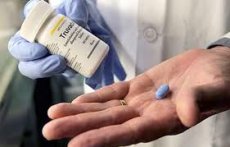Analysts: Truvada - the beginning of a new era in the fight against AIDS
Last reviewed: 23.04.2024

All iLive content is medically reviewed or fact checked to ensure as much factual accuracy as possible.
We have strict sourcing guidelines and only link to reputable media sites, academic research institutions and, whenever possible, medically peer reviewed studies. Note that the numbers in parentheses ([1], [2], etc.) are clickable links to these studies.
If you feel that any of our content is inaccurate, out-of-date, or otherwise questionable, please select it and press Ctrl + Enter.

The College of American Health Professionals for the first time approved the use of a drug to prevent HIV infection.
Doctors recommended that the US Food and Drug Administration (FDA) authorize the daily use of Truvada medicines by people at risk for HIV / AIDS.
The FDA should not legally listen to the recommendations of the expert panel, but as a rule follows its advice.
Analysts tell about the beginning of the new era in the fight against AIDS.
Previously, the FDA has already approved the use of Truvada in the appointment of comprehensive treatment for people infected with HIV, and it is prescribed along with the available antiretroviral drugs.
Studies conducted in 2011 found that this drug, produced in California by Gilead Sciences, significantly reduced the risk of HIV infection among homosexual men, in addition to healthy heterosexual partners of infected people - by 44-73%. Medication or indulgence?
The ADAC experts advising the FDA on the use of new medicines have decided to recommend the use of Truvada to people at highest risk for men who are not HIV-positive and have multiple sexual contacts with different people male partners.
"For" this decision voted 19 members of the ADAC council, "against" - three expressed themselves.
The majority of votes of the ADAC Council also decided to recommend the use of Truvada to healthy partners of people who are carriers of immunodeficiency, as well as people belonging to other risk categories and having the chance of contracting HIV through sexual contact.
The vote was preceded by an 11-hour examination and a lengthy public debate.
Some doctors expressed suspicion that the new remedy could provoke people into more risky sexual behavior or lead to the formation of a strain of the virus that will be resistant to drugs.
However, the overwhelming majority of specialists welcomed the decision of the council.
The meeting of members of the FDA on these issues is scheduled for June 15.

 [
[